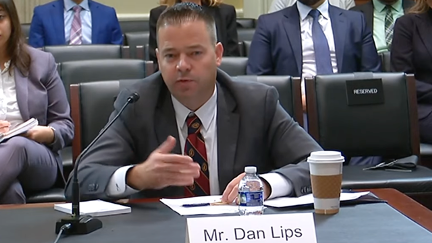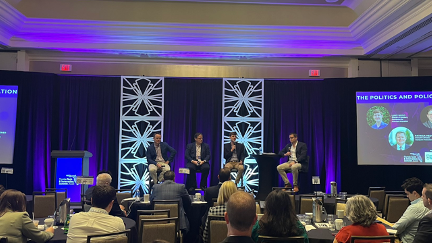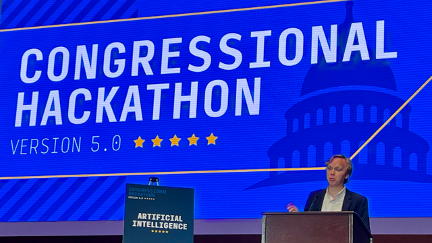
Dear friend of FAI:
I’d like to share with you some of our recent activities, including new analysis from the Research team, project updates from Labs, and other developments across the Foundation for American Innovation.
Research
Our policy team had a busy quarter, working to strengthen national security, improve American governance, and keep America at the forefront of technological dynamism. Our bench of experts continues to grow: this quarter we brought on Alexei Bulazel, former director on the National Security Council staff, as a Senior Advisor, and Thomas Hochman as a Research Associate to help with our research papers and podcasts.
Reports, Testimony, and Comments
In the Summer 2023 issue of the New Atlantis, Senior Fellow Jon Askonas continued his media ecology series, Reality: A Post-Mortem. In his latest essay, “An America of Secrets,” he argues that the “dark matter ripping the country apart, shredding our shared sense of reality and faith in our democratic government … is not misinformation, it isn’t conspiracy theories, and it isn’t the establishment, exactly. It is secrecy.”
Dan testified before the House Committee on Administration’s Subcommittee on Modernization at its hearing on “Legislative Branch Advancement: GAO Modernization.” In his testimony, Dan discussed the value that the Government Accountability Office provides Congress, how nonpartisan oversight can advance congressional modernization, and how Congress can strengthen and leverage GAO to meet the nation’s fiscal and governance challenges.

Policy Technologist Lars Erik Schönander released a report, “ZPMC and America’s Ship-to-Shore Crane Industry: Recommendations for Improving Port Security.” The report provides new data on the crane inventory of major U.S. container ports, finding that the average port of those surveyed has 49 percent of its ship-to-shore cranes from a single Chinese company, ZPMC. Malign actors could hack these cranes to spy on our ports, collect critical information on our port system, and even sabotage the cranes and disrupt port operations. Lars offers recommendations for how Congress, federal agencies, and ports can secure this critical infrastructure. Lars and FAI board member Michael Kratsios, former Chief Technology Officer of the United States and Under Secretary of Defense at the Pentagon, summarized the findings in Newsweek, and the report received a write-up in POLITICO Pro.
On his Substack, Second Best, Sam has been publishing “AI and Leviathan,” an essay series on “the potential near-term impact of artificial intelligence on our government and institutions.” Part I considers the institutional economics of an intelligence explosion; Part II assesses AI’s potential for a regime-change level transformation of our political institutions; and Part III offers a hypothetical “timeline of our techno-feudalist future.” Look for a concluding Part IV in the coming weeks. The series received a write-up in POLITICO’s Digital Future Daily, and Sam joined Erik Torenberg’s podcast Upstream to discuss the series in more detail. He also partnered with POPVOX Foundation and Demand Progress to give a presentation to congressional staff about “Legislating for (and with) Artificial Intelligence.”
In another paper, “Securing the Skies: Chinese Drones and U.S. Cybersecurity Risks,” Lars considers the cybersecurity risks posed by the U.S. government’s reliance on Chinese drones. The paper provides the first estimate of state-level drone spending in non-police agencies, finding that on average, 85 percent of the drones bought by state agencies from 2010 to 2022 were Chinese, and that the average state devoted 76 percent of its drone spending to Chinese drones. Lars offers recommendations for how Congress, state policymakers, and executive branch agencies can reduce the U.S. government’s reliance on Chinese drones and improve our cybersecurity. He summarized the report in a piece for The Messenger.
Senior Fellow Geoff Cain contributed an essay to the German Marshall Fund's report, Next-Generation Perspectives on Taiwan Insights from the 2023 Taiwan-US Policy Program. His essay, “Not So Fab,” argues that the CHIPS and Science Act, passed last year, fails to address the problems hampering global supply chain cooperation. Geoff calls for the U.S. to abandon the belief that it alone can reinvigorate its national manufacturing capabilities, and instead work to supercharge the Chip 4 Alliance that joins the U.S. with Japan, Taiwan, and South Korea.
Lars testified before the Congressional Western Caucus at a forum on the “Dangers of the CCP Buying American Farmland.” Continuing his research with Geoff, he discussed the growth in purchases of U.S. farmland near military bases by Chinese government-affiliated companies. Lars offered recommendations for how Congress can restrict foreign investors’ ability to purchase farmland and property next to critical infrastructure.
Sam submitted a comment to the White House Office of Science and Technology Policy (OSTP) in response to the Office's request for information toward the development of a national AI strategy. He argues that a forward-looking strategy should focus on three dimensions of AI safety: the unique risks associated with powerfully general AI systems, the national security imperative of U.S. technological leadership in AI vis-à-vis our foreign adversaries, and the “failure to adapt” risk posed by large-scale disruption to legacy institutions.
Senior Advisor Evan Swarztrauber submitted a comment to the Universal Service Fund Working Group regarding the Universal Service Fund, a program administered by the Federal Communications Commission (FCC) to support rural broadband, internet in schools and hospitals, and phone service affordability. Evan argues that Congress and the FCC should consolidate broadband programs to prevent waste and duplication and should develop a sustainable funding mechanism for the Fund.
Director of Outreach Luke Hogg has been writing broadly about the European Union’s hostile attitude toward American tech companies. As he has explained in the Washington Examiner, Brussels has been unfairly applying the Digital Markets Act and the General Data Protection Regulation in an effort to punish American companies and revitalize its own dead tech industry. To make matters worse, as Luke has discussed in Pirate Wires, an unholy alliance is forming between EU and California, as regulators on both sides of the Atlantic aim to stifle tech innovation. Throughout his writings, Luke offers recommendations for how U.S. policymakers can push back against onerous restrictions, both domestic and international.
I contributed to and signed a coalition letter submitted to members of the U.S. House of Representatives and U.S. Senate, expressing concern about calls for new copyright legislation that would jeopardize the benefits of AI and upend the core governing principles of our nation’s intellectual property regime. We argue that existing copyright doctrine has evolved to accommodate many revolutionary technologies and is capable of addressing creators’ legitimate concerns.
Head of Policy Dan Lips was a signatory to a report published by the Aspen Strategy Group, “Re-Engineering American Security: Cultivating Talent for Competitiveness.” The report calls for investing in both national security-relevant sectors and the human talent to support those sectors.
Commentary and Impact
Many policies that our scholars have advocated for saw progress this quarter.
Several of our institutional priorities are reflected in the appropriations bills that have passed through the House and Senate and are on their way to the conference committee, including:
- Language in the House version of the Department of Homeland Security funding bill restricting DHS money from being used to purchase Chinese drones.
- $5 million in new funding for the Open Technology Fund from House Republicans. As Dan has explained, OTF plays a crucial role in advancing global internet freedom.
- A $15 million increase in funding for GAO from House Republicans. Dan has written widely about GAO’s essential work as Congress’s watchdog agency, which provides significant taxpayer savings.
- Language improving upon the success of GAO’s Science, Technology Assessment and Analytics team from Senate appropriations. I’ve argued that STAA can help boost Congress’s technical capacity in areas like AI.
- Flat funding levels for the Bureau of Industry and Security from House Republicans, avoiding expected budget cuts. Sam has written about BIS’s value in “promoting continued U.S. strategic technology leadership.”
- Increased data transparency requirements for information related to appropriations from Senate Appropriations. We’ve advocated greater transparency around funding requests as an important way to keep Congress accountable and effective.
- $1 million in the House farm bill to update the Agricultural Foreign Investment Disclosure Act.
- The inclusion in the Senate National Defense Authorization Act of the American Security Drone Act, which would ban the purchase or use of Chinese drones by all federal departments.
Our work was also reflected in the House’s version of the Federal Aviation Administration reauthorization package, which would restrict the FAA from using Chinese drones for infrastructure inspections.
Our work to strengthen the legislative branch also resulted in important appropriations successes:
- In a constrained fiscal environment, the House legislative branch appropriations bill renews the $10 million House of Representatives Modernization Initiatives Account.
- The report accompanying the appropriations bill includes language formalizing the House AI Working Group established by the Chief Administrative Office and directs it to “produce a report examining the near-and mid-term opportunities for generative AI tools, as well as strategies to mitigate new risks.”
- That report also includes provisions addressing several priorities that we outlined in a paper with Demand Progress, including:
- The development of a tool to deconflict committee schedules
- The establishment of an internal staff directory
- Increased cybersecurity assistance for members of the House
- Continued support for STAA at GAO
- Improved requirements regarding the security of legislative branch data
- Increased public access to non-sensitive legislative branch data
- The establishment of outreach offices for legislative branch support agencies
- A feasibility study on digitizing and centralizing all authorizing and appropriating legislation from 2000 onward for use by Congress and the public
- Encouragement to modernize the Library of Congress, including by publishing all Congressional Research Service reports in HTML.
- The report in both the House and Senate includes language in line with Dan’s work on legislative and agency action to address GAO’s unimplemented recommendations, which could save billions of dollars each year.
- Finally, despite challenging fiscal constraints, House Republicans produced a strong legislative branch appropriations bill that preserved or enhanced staff capacity for technical and IT staff, committee staff, and support agencies, so that the legislative branch can continue to perform its many functions.
As noted above, Geoff and Lars have called for greater oversight of land acquisitions by foreign entities. Representative Mike Gallagher, Chairman of the House Select Committee on the Strategic Competition between the United States and the Chinese Communist Party, has introduced legislation to prevent foreign adversaries from purchasing land near military bases.
Lars has called for improving the transparency of the Agricultural Foreign Investment Disclosure Act, which requires the Department of Agriculture to collect data on foreign investor ownership of U.S. agricultural land. The Department recently took the important step of making public its database of foreign ownership.
To counter Chinese drones’ cybersecurity risks, Lars has called for boosting domestic drone manufacturing abilities. We’re excited by the Pentagon’s recent unveiling of a new production program to help the U.S. compete with China.
Former FACET Fellow Deepesh Chaudhari has written about the need for a technology assessment of generative AI’s potential risks. In July, GAO announced that STAA will produce this report, in response to a request from Senators Ed Markey and Gary Peters.
Dan and Lars have warned about U.S. education’s vulnerability to foreign, and especially Chinese, influence, and called for greater transparency and accountability for foreign contributions to U.S. schools. To that end, a group of senators recently called for a nationwide audit to “determine how much funding from hostile foreign governments has flowed into America’s K-12 schools.”
Our commentary included the following:
- Jon Askonas, “Tucker and Trump are TV’s Gravediggers,” in COMPACT
- Michael Kratsios, “End The STA: Stop Helping China Steal,” in the American Conservative
- Zach Graves and Robert Bellafiore, “Our New Sputnik Moment,” in City Journal
- Luke Hogg, “Government Wants to Control Your Digital Identity,” in Reason
- Thomas Hochman, “America’s Only Cobalt and Nickel Refinery Breaks Ground,” in National Review
- Geoff Cain and Tarah Wheeler, “There’s A Cop In My Pocket: Policymakers Need to Stop Advocating Surveillance by Default,” for the Council on Foreign Relations
- Alex Dubin, “SpaceX’s Starship Rocket Is Essential for America’s Space Ambitions,” in the National Interest
- Lars Erik Schönander and Dan Lips, “Congress Should Restrict Federal Use of Chinese Drones,” in the National Interest
- Lars Erik Schönander, “Can America Escape Its Addiction to Sanctioning?” the National Interest
- Luke Hogg and Lars Erik Schönander, “Meta’s Interoperable Reversal,” in Tech Policy Press
- Jon Askonas, “Republicans Need a Legislative Approach to AI,” in the Washington Examiner
- Alex Dubin, “India Embraces America’s Vision for Outer Space,” in The Hill
- Dan Lips, “When the Watchdog Won’t Bark,” in The Hill
- Robert Bellafiore, “Scarcity Is about More Than the Market,” in Public Discourse
- Jon Askonas, “Corporate Tyranny,” in Plough
- Roslyn Layton, “The ITC Needs Bipartisan Reform to Deter Patent Speculators,” in Bloomberg Law
- Roslyn Layton, “Common Carriage Is Distorting the Freight Rail Market,” in Bloomberg Law
- Roslyn Layton, “CPUC Decision Will Help Make Broadband More Affordable and available to Californians,” in Capitol Weekly
- Satya Thallam and Dan Lips, “Congress Should Prepare to Lead on Regulation,” on the Federalist Society blog
- Dan Lips, “Strengthening the Talent Pipeline with More Effective Education R&D”
- Dan Lips, “Why the Department of Education Should Improve R&D Transparency”
Highlights among our media hits included the following:
- Jon joined BlazeTV to discuss “the only way to survive the AI takeover.”
- Jon joined COMPACT’s podcast to discuss his essay “Why Conservatism Failed.”
- Non-Resident Senior Fellow Antonio García Martínez spoke to Blockworks about the challenges of Web3 ad attribution.
- Luke spoke to DC Journal about the Securities and Exchange Commission’s ongoing efforts to regulate crypto.
- Jon joined Upstream to discuss how disruptive technologies such as AI shape religion, the media, culture, and politics.
Fellowships
Alex Dubin, FAI’s Endless Frontier Fellow, completed his yearlong tenure with us, during which he wrote widely about the science and geopolitics of U.S. space policy. He’ll continue to be affiliated with FAI as an Advisor.
In June, we completed our third cohort of the Policy Hacker Fellowship. Policy Hackers is a non-resident fellowship program for tech professionals looking to build expertise in the theory and practice of public policy. Over the year-long program, we teach fellows the fundamentals of policy entrepreneurship and innovation policy and introduce them to scholars, government policymakers, and public relations experts.
Labs
It’s been an exciting quarter for the Labs team. Our goal is to bring technology and creative partnerships to bear in solving high-stakes problems facing our country, and we’re pleased to report on the success that our products are seeing.
Schoolahoop
2023 is shaping up to be the break-out year for Schoolahoop, our platform for school choice. The platform streamlines the process of identifying the right schools by helping parents find relevant schools and scholarships, connecting them to program administrators, and showing parents what options fit their needs. User growth has increased more than 2,300 percent since the start of the year (up from 1,600 percent through Q2 earlier this year).
We’ve seen our biggest successes in Florida this year. We’ve had roughly 10 percent of all parents with children in grades K-12 in the state use Schoolahoop, which is the highest adoption rate we’ve seen in any state in our history. Schoolahoop’s popularity in Florida, together with parents’ embrace of the state’s new education savings accounts, gives us even more confidence that Schoolahoop is a tool that every state needs. We also recently formed a boots-on-the-ground partnership in Florida with GuidEd. Building on our relationships with Step Up for Students and ExcelinEd, we’re now partnered with the three biggest school choice organizations in Florida, a feat no other organization in our space can claim.
As our traction and user growth increase nearly every day, we’re also excited about new features in the works. We’re planning to add Spanish as a language option, and later this year we’ll be launching a “Claim Your School” feature, which will empower schools to claim and update their Schoolahoop profiles so that parents have the most up-to-date information. This feature is at the core of our monetization strategy to eventually make Schoolahoop self-sustaining. We’re also excited to launch in West Virginia in the next few months.
We owe much of our growth to not just our great team, but also our partners at School Choice Wisconsin and Step Up for Students, who have a deep understanding of how to launch in a new state and generate interest from schools and parents. Step Up for Students has been a great resource for Florida parents who want to talk to a local expert.
Finally, we’ve received a generous matching grant of $100,000 from an anonymous donor to roll out Schoolahoop in Iowa and Missouri, but to take advantage of the grant, we’ll need to raise the matching funds. If you or anyone you know is interested in working with us, please don't hesitate to reach out to our Head of Product, Brandon Detweiler, at brandon@thefai.org, and our Chief Operating Officer, Grace Meyer, at grace@thefai.org.
BIPBounty
BIPBounty is the first platform for crowdsourcing tax-deductible bug bounties for Bitcoin Improvement Proposals (BIPs). We’ve received 1.31 BTC in bounty program donations, and last month we made our first grant for a proposal that we received. We’re excited that BIPBounty has been gaining traction, and we’ve been receiving great feedback on new BIPs to add to the platform, as well as other opportunities with Bitcoin founders and influencers to create tax-deductible ways of supporting Bitcoin R&D projects. We’re also aiming to add additional BIPs and other Bitcoin R&D projects to support the open-source development of Bitcoin.
Project Nickel
Project Nickel is FAI's platform for parents, journalists, and policymakers who want to see what public schools spend and where their money goes. We aim to improve transparency in K-12 school spending because we believe it should be easy for the public to know how much money is being spent by our public school system. In a recent blog post for reimagineED, Brandon highlighted the huge difference between what parents think schools spend per student (on average, $5,000) and what schools actually spend (on average, $14,300). Correcting this misperception, and building support for state-level reforms to give parents more control over their children's education funding, are exactly why Project Nickel exists.
Events
This quarter, we hosted events across the country with some of our favorite organizations and thinkers.
In July, we held a Schoolahoop salon dinner in Dallas, where we discussed Schoolahoop’s contributions to the broader school choice movement.
In July, we held an invitation-only symposium in DC on “The Future of AI Regulation: Conservative Perspectives,” where we considered the present and future of American AI regulation with leading center-right policy experts, futurists, and industry professionals. We held a salon dinner that evening to continue the conversation.
In September, we co-hosted a salon dinner on defense tech and national security. Jon and Joshua Steinman, CEO of Galvanick and former Senior Director for Cyber Policy and Deputy Assistant to the President, led a discussion on the promise offered by new technology and new funding models for revitalizing American industry and strengthening our national defense.
Other highlights among the events our scholars spoke at included the following:
- Sam joined the Center for the National Interest to ask, “What are the Perils and Promise of Artificial Intelligence?”
- Sam joined Young Voices for a panel discussion on “Immigration: For the Elites or for You?”
- Luke spoke at a panel at FreedomFest about “The Future of Decentralized Technologies; Its Promise and Peril.”
- Lars presented his research on the U.S. government’s reliance on Chinese drones at a meeting of the American Legislative Exchange Council’s Homeland Security Task Force.
- At The James Madison Institute’s 2023 Tech and Innovation Summit, Luke spoke on a panel about “The Politics and Policies of Innovation,” while Evan spoke on a panel about broadband deployment and closing the digital divide.

- In a fireside chat hosted by the R Street Institute, Luke joined former FCC Commissioner Mike O’Rielly to present “The Conservative Case for the Affordable Connectivity Program.”
- Jon joined experts from The Heritage Foundation for a panel discussion before Senate staff about how to think about AI regulation.
- At the fifth annual Congressional Hackathon, Lars gave a demo of a new legislative research tool FAI developed for the rules of the House of Representatives, and a presentation on the use of artificial intelligence in Congress.

Podcasts
On our podcast, The Dynamist, Evan brought on some of today’s most important thinkers and doers to discuss the future of technology, governance, and innovation. Recent episodes have featured Scott Wallsten, president of the Technology Policy Institute, Thomas Hogan, former Chief Economist for the U.S. Senate Banking Committee; and Isaac Stone Fish, CEO of Strategy Risks.
Saagar Enjeti and Marshall Kosloff have continued hosting the podcast The Realignment, which is sponsored by FAI. They’ve had conversations in recent months with figures such as Megan Reiss, Founder and CEO of SolidIntel Inc. and former National Security Policy Advisor for Senator Mitt Romney; Robert D. Kaplan, author of The Loom of Time: Between Empire and Anarchy, from the Mediterranean to China; and Larry Kramer, president of the William and Flora Hewlett Foundation.
Book Recommendations
The FAI team has been getting into some great books in recent months. Like many, for me this included Walter Isaacson’s new biography of Elon Musk. For a different perspective on Musk’s life, be sure to also read Nonresident Senior Fellow Jimmy Soni’s award-winning book, The Founders: The Story of Paypal and the Entrepreneurs Who Shaped Silicon Valley, published last year.
Here are some other books that members of the FAI team have enjoyed recently:
- Extraordinary Popular Delusions and the Madness of Crowds, by Charles MacKay
- Freedom's Forge: How American Business Produced Victory in World War II, by Arthur Herman
- The Death and Life of Great American Cities, by Jane Jacobs
- For Profit: A History of Corporations, by William Magnuson
- Gravity's Rainbow, by Thomas Pynchon
- A Tale of a Tub and Other Works, by Jonathan Swift
- Strange Rites: New Religions for a Godless World, by Tara Isabella Burton
- Micromotives and Macrobehavior, by Thomas C. Schelling
- Snow Crash, by Neal Stephenson
- The Immortalization Commission: Science and the Strange Quest to Cheat Death, by John Gray
- Things Hidden Since the Foundation of the World, by René Girard
- Butcher's Crossing, by John Williams
You can also see a longer list of our recommendations on our Bookshop page.
Coming Soon
We have many projects in the works and are excited about the next few months. We’ll be publishing reports on satellite internet technology, the Ukrainian and American drone industries, nuclear energy regulations, and more. We’ll also be hosting events in San Francisco and DC focused on bringing technical talent into government service, AI’s implications for the creator economy, and the national security imperative of strengthening our K-12 education system. And looking further ahead, we’ve got big plans to celebrate our 10th anniversary next spring in San Francisco. Stay tuned for news in the coming months!
Thank you for following our work. We appreciate your continued interest in FAI and welcome any questions or feedback.
If you’re interested in supporting our mission, you can donate here.
Sincerely,
Zach Graves
Executive Director
Foundation for American Innovation